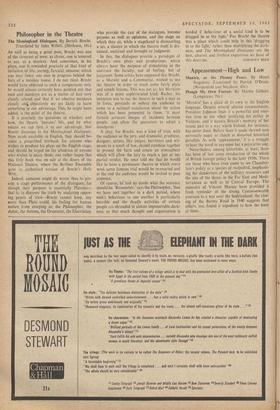Philosopher in the Theatre
The Messingkauf Dialogues. By Bertolt Brecht. Translated by John Willett. (Methuen, 16s.) As well as being a great poet, Brecht was one of the cleverest of men; as clever, one is tempted to say, as a monkey. And sometimes, in his plays, one is reminded precisely of that kind of imitation of life, jeering, farcical, obscene, which one may fancy one sees in progress behind the bars of a monkey house. I do not think Brecht . would have objected to such a comparison; only he would almost certainly have pointed out that men and monkeys are as a matter of fact very closely related and that if we observe monkeys closely and objectively we are likely to learn something to our advantage. This, he might have added, is the point of the theatre.
It is precisely the questions of whether; and how, the theatre 'imitates' life, and by what means we can turn it to our advantage, that Brecht discusses in the Messingkauf Dialogues. Now made available in English, they should be- come a prescribed textbook for anyone who wishes to produce his plays on the English stage, and should be urged on the attention of anyone who wishes to enjoy them; one rather hopes that this little book was on sale at the doors of the National Theatre, where the Berliner Ensemble gave its authorised version of Brecht's Holy Writ.
Indeed, someone might do worse than to pre- sent a stage performance of the dialogues, for though their purpose is essentially Platonic— that is, to discover the truth by analysing oppos- ing points of view—Brecht cannot keep, any more than Plato could, his feeling for human nature. from creeping in; the Philosopher, the Actor, the Actress, the Dramatist, the Electrician,
who provide the cast of the dialogues, become persons as well as opinions, and the stage on which they sit, while a stagehand is dismantling a set, a theatre in which the theatre itself is dis- cussed, analysed and brought to judgment.
In this, the dialogues provide a paradigm of Brecht's own plays and productions, which always have the purpose of stimulating in the audience the faculty, not of feeling, but of judgment. Some critics have supposed that Brecht, as a Marxist and a Communist, wished to use the theatre in order to teach some fairly plain and simple lessons. This was not so; his Marxism was of a more sophisticated kind. Rather, his intention was to use the theatre in such a way as to force, persuade or seduce the audience to come to a rational conclusion about the action which has been presented to them; 'it must furnish accurate images of incidents between people, and allow the spectators to adopt a standpoint.'
A play, for Brecht, was a kind of trial, with the audience as the jury, and dramatist, producer, designer, actors, like judges, barristers and wit- nesses in a court of law, should combine together to present the facts and create an atmosphere which will allow the jury to reach a just or im- partial verdict. He once told me that he would like to have a permanent theatre in which every week some famous trial would be re-enacted and at the end the audience would be invited to pass sentence.
Of course, he had no doubt what the sentence should be. 'Remember,' says the Philosopher, 'that we have met together in a dark period, where trieb's behaviour to one another is particularly horrible and the deadly activities of certain people are shrouded in almost impenetrable dark- ness, so that much thought and organisation is
needed if behaviour of a social kind is to be dragged in to the light.' For Brecht the theatre was a place which could help in this 'dragging in to the light,' rather than multiplying the dark- ness, and The Messingkauf Dialogues are the best, clearest and liveliest exposition we have of


































 Previous page
Previous page